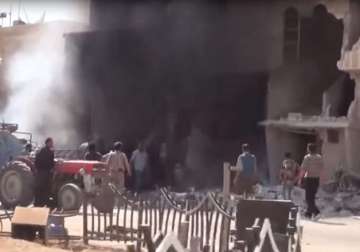Syria: New Russian strikes, talks in Paris on Assad's future
Paris: The presidents of Russia and France, which both started bombing Syria this week, held talks Friday about their military operations as they tried to overcome differences on whether Syrian President Bashar Assad should stay

Paris: The presidents of Russia and France, which both started bombing Syria this week, held talks Friday about their military operations as they tried to overcome differences on whether Syrian President Bashar Assad should stay in power.
The Russian, French and German leaders met in Paris after a week of frenzied international activity around Syria that finally broke into Friday's meeting, which was supposed to have been only about Ukraine.
Russian fighter jets have kept up a sustained bombing campaign since Wednesday, including 10 new airstrikes overnight. While Russia says it's targeting extremists, Western officials suspect Russia of using the air campaign as a pretext to go after anti-Assad rebels.
Vladimir Putin entered Friday's meeting after an intervention that ensured Russia's role as a major player in Syria's fate. In the space of a few days, Russian airstrikes and Putin's diplomatic maneuvering at the U.N. first raised hopes for a diplomatic breakthrough — then brought fears of a new proxy war with the West.
"Putin's economy may be in tatters, and the domestic outlook isn't great, but his foreign policy game has been very strong lately. Why? Because he has astutely recognized the West's priorities and linked them to his own," said Alexander Kliment, Russia director for Eurasia Group.
A senior French diplomat said Putin and French President Francois Hollande tried to bridge the differences over an eventual political transition in Syria, and also talked about the airstrikes by Russia and the U.S.-led coalition, and protecting civilians. The official was not authorized to be publicly named and spoke on condition of anonymity.
Assad's future is a major sticking point: He's Russia's main ally in the Middle East, while France is firmly opposed to his rule.
At the United Nations, Syrian Foreign Minister Walid al-Moallem said the Assad administration would participate in U.N.-led working groups toward a third round of Geneva talks on the fate of the country. He hinted that any change in leadership was far in the future.
"How can we ask the Syrian people to head to the ballot box while they are not safe in the streets?" he asked.
He added that Syrian forces — and not just airstrikes — are the only hope of defeating Islamic State extremists.
Russia's airstrikes have prompted discussions in the Pentagon about whether the U.S. should use military force to protect U.S.-trained and -equipped Syrian rebels if they come under fire by the Russians. The Pentagon on Thursday had its first conversation with Russian officials in an effort to avoid any unintended U.S.-Russian confrontations.
The first Russian airstrikes on an Islamic State-held area hit a town near its de facto capital of Raqqa in northern Syria on Thursday, according to images from the Russian Defense Ministry and Syrian activists.
Activists say IS suspended Friday prayers in several mosques in Raqqa, fearing new Russian airstrikes.
The Russian Defense Ministry statement Friday said the latest wave of airstrikes targeted only IS and destroyed a command post near Daret Azzeh in the Aleppo region and hit a field camp near Maaret al-Numan in the Idlib region, wiping out bunkers and weapons stores.
The ministry released cockpit video of the bombing of the Kassert-Faradz command post and of two attacks in Maaret al-Numan.
Russian jets appeared to be primarily bombing central and northwestern Syria, strategic regions that are the gateway to Assad's strongholds in the capital of Damascus and the coast.
However, given rapidly shifting battlefield terrain in Syria's chaotic civil war, it can be difficult to distinguish which groups hold what territory.
Leaders around the world are concerned about Islamic extremists who have seized territory and power in the chaos of Syria's civil war — and now threaten attacks abroad. But Russia and the West don't appear to be bombing Syria for all the same reasons.
Allies in the U.S.-led coalition have called on Russia to cease attacks on the Syrian opposition and to focus on fighting Islamic State militants.
Russian Foreign Minister Sergey Lavrov on Thursday rejected suggestions that the airstrikes were meant to shore up Assad, Moscow's main ally in the Middle East.
Lavrov insisted Russia was targeting the same militant groups as the U.S.-led coalition, which is conducting its own airstrikes in Syria: the Islamic State group, the al-Qaida-linked Nusra Front and other groups.
Putin came to Friday's meetings with the upper hand militarily. It's a tactic he's used in the past: Before major peace talks on Ukraine's conflict in 2014 and earlier this year, Russia sent troops to bolster struggling separatists, weakening the Ukrainian government's negotiating power.
Germany has stayed out of the military action in Syria and pushed for a political solution.
Ahead of the Paris talks, German Chancellor Angela Merkel stressed the importance of tackling the reasons hundreds of thousands of people are fleeing to Europe this year, and "that goes for Syria in particular."
"We have all known for years that there can only be a solution there with Russia, and not against Russia," Merkel said Thursday.
A jihadi cleric based in Syria warned Russia that the Arab country will be a "graveyard for invaders."
Abdullah al-Muhaysini, a Saudi militant linked to the Nusra Front, said the Russian campaign could bog down like repeated foreign interventions in Afghanistan.